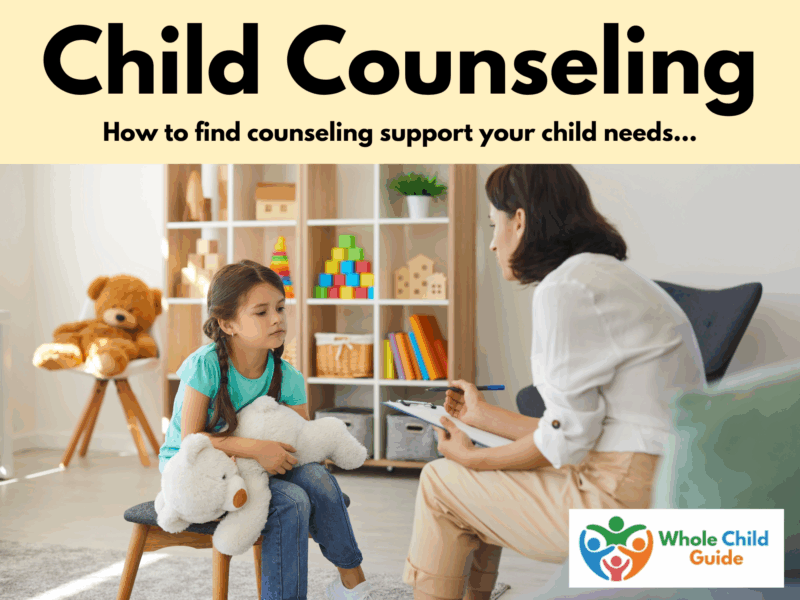
If you’ve ever searched online for “child counselor near me” or “pediatric counselor near me,” you’re not alone. Many parents face moments when they wonder if their child could benefit from extra emotional support, and knowing where to start can feel overwhelming.
Whether you’re looking for counseling for kids to help with anxiety, behavior struggles, school challenges, grief, or big life changes, the right child counselor can make a meaningful difference for your child’s well-being and your family’s peace of mind. This post will walk you through how to find a child counselor, what they work on, and how to choose the right one for your child’s unique needs.
What Does a Child Counselor Work On?
A child counselor is trained to help children navigate emotional, behavioral, and social challenges. They use age-appropriate techniques like talk therapy, play therapy, art, or cognitive-behavioral strategies to help children:
- Manage anxiety, worries, or fears
- Cope with depression or low mood
- Improve emotional regulation and coping skills
- Work through trauma, loss, or family changes (such as divorce or a move)
- Build social skills and strengthen peer relationships
- Address behavioral challenges at home or school
- Support neurodivergent kids with ADHD, autism, or sensory needs
The goal of child counseling is not just to address a problem, but to support the whole child, emotionally, socially, and developmentally, so they can thrive.
How Do I Know If My Child Needs Counseling?
Many parents wonder, “How do I know if my child needs counseling?” Here are some common signs your child may benefit from therapy:
- Sudden changes in mood, sleep, or appetite
- Withdrawal from friends or activities they once enjoyed
- Persistent worries, fears, or physical complaints (like headaches or stomachaches) without a clear medical cause
- Big emotions or meltdowns that are hard to calm
- Trouble at school, like falling grades, behavioral issues, or frequent absences
- Difficulty coping with a major life event (loss, divorce, moving, illness)
- Behavior that feels out of control or hard to manage at home
- Self-esteem struggles or frequent negative self-talk
If you notice any of these signs, or if you simply feel concerned and unsure, a child counselor can help assess your child’s needs and recommend support.
When Should You Take Your Child to a Counselor?
You don’t have to wait for a crisis to find support from a child counselor. Counseling can be helpful both for children in acute distress and for those who just need extra support navigating big emotions or changes. If your child’s struggles are interfering with daily life, relationships, or well-being, or if you as a parent are feeling overwhelmed trying to help, it may be time to explore counseling.
How to Find the Best Child Counselor Near You
Here’s how to start your search for the best child counselors near you:
- Ask your pediatrician, teacher, or school counselor for recommendations.
- Use specialized directories like Whole Child Guide to search for pediatric counselors by location, specialty, and experience.
- Look for providers who have experience with your child’s specific needs, whether that’s therapy for child anxiety, depression, behavior issues, ADHD, autism, or trauma.
- Read reviews or ask other families for feedback when possible.
- Check credentials: Look for licensed mental health counselors (LMHC), licensed clinical social workers (LCSW), psychologists, or marriage and family therapists (MFT) with pediatric experience.
How to Choose a Child Counselor
Finding the right child counselor or pediatric therapist is about more than just credentials, it’s about finding someone who makes your child feel safe, heard, and supported. Here’s what to consider:
- Schedule an introductory call to discuss your child’s needs, your family’s goals, and the counselor’s approach.
- Ask about experience with kids your child’s age or diagnosis.
- Ask how they involve parents in the process.
- Trust your instincts: The right counselor will feel like a partner, not just a provider.
Summary and Next Steps to Find a Child Counselor
Choosing to seek counseling for your child is an act of strength, love, and care. A good child counselor can help your child navigate challenges, build resilience, and thrive, not just at home, but at school, with friends, and in their emotional world. Ready to get started? Use Whole Child Guide to find trusted local child counselors who understand your child’s unique needs and can help your family move forward with confidence.
